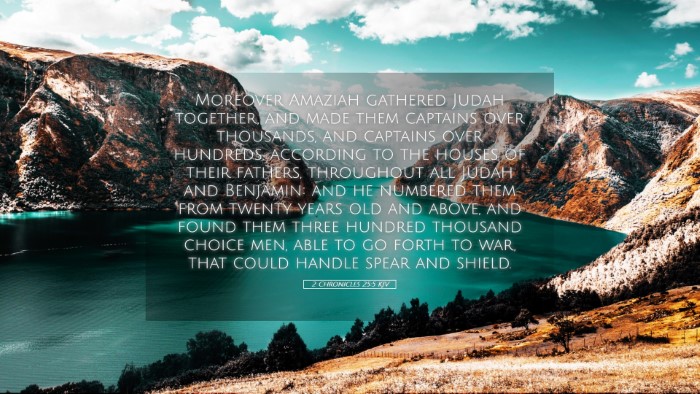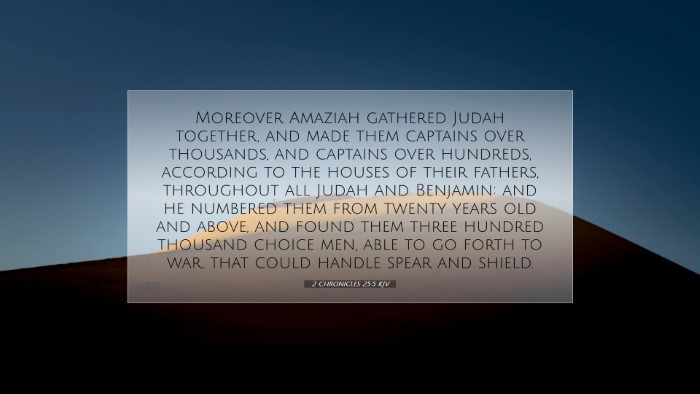Commentary on 2 Chronicles 25:5
Verse Context:
2 Chronicles 25:5 states, "Moreover, Amaziah gathered Judah together, and made them captains over thousands, and captains over hundreds, according to the house of their fathers, throughout all Judah and Benjamin: and he assembled them to him, and they numbered them from twenty years old and above, and found them three hundred thousand choice men, able to go forth to war, that could handle spear and shield."
Overview of Amaziah's Reign
The verse presents a key moment in the reign of King Amaziah of Judah, emphasizing his leadership and military preparations. After ascending the throne, Amaziah seeks to organize and strengthen his military forces by gathering able-bodied men from Judah and Benjamin, the two tribes of the southern kingdom.
Leadership and Organization
Matthew Henry's Perspective:
Henry emphasizes the importance of leadership in the life of Amaziah. He points out that a good leader must be proactive in preparing for the future. The choice of leaders, or captains, over the men signifies a structured approach to governance, indicative of Amaziah's desire to establish order and strength within his realm. By organizing his people based on familial lines, they would be more inclined to fight together, which signifies a communal bond that would be beneficial in battle.
Albert Barnes adds:
Barnes highlights the military strategy employed by Amaziah. The categorization of soldiers into units reflects military practices of the time and demonstrates Amaziah's attention to traditional structures that promote unity and effectiveness in warfare. His decision to enlist men from twenty years old and above suggests his aim to consolidate a youthful and vigorous army, capable of engaging in battle.
Military Preparations
Amaziah's actions can be seen as a reflection of his commitment to fortifying Jerusalem against external threats. His assessment in numbering the men showcases practical wisdom in ensuring he had sufficient forces before engaging in military campaigns.
Theological Implications
The selection and organization of troops can also be interpreted through a theological lens. Adam Clarke's Commentary points out that this kind of military preparation can symbolize the vigilance that God’s people are called to maintain. Just as Amaziah prepared physically for battles, believers are encouraged to prepare spiritually for the spiritual battles they face.
Significance of the Number
The text specifies that Amaziah assembled three hundred thousand choice men. The number itself serves not just as a statistic but as a representation of God's provision and the collective strength of Judah. This aligns with the broader narrative of God using specific numbers to demonstrate His authority and the role of human agency in fulfilling divine purposes.
Understanding 'Choice Men'
The term "choice men" indicates a select group who were deemed capable and fit for battle. This distinction implies a process of selection based on leadership qualities, bravery, and loyalty. Many commentators reflect on how God, too, seeks choice individuals among His people to carry out His work in the world.
The Nature of Warfare in the Bible
Warfare in the Old Testament is often a physical manifestation of spiritual truths. As Barnes notes, the battles fought by the Israelites often mirror the struggles faced by Christians today. The call to arms serves a dual purpose: it prepares the people physically while also reminding them of their ultimate reliance on God for victory.
Leadership Lessons for Modern Context
- Effective Organization: Pastors and leaders today can learn from Amaziah's method of organizing his men. Structure in leadership is critical for achieving goals.
- Community and Unity: The familial structure encourages community integration and a sense of shared purpose. Similarly, church leadership should foster unity among congregants.
- Preparation is Key: Just as Amaziah prepared for physical warfare, spiritual preparation is vital for believers. This could relate to prayer, study of the word, and fostering relationships within the church community.
Conclusion
The insights derived from 2 Chronicles 25:5 concerning Amaziah's reign, his military organization, and the implications for leadership and spiritual warfare are profound. By assessing these elements, leaders can glean valuable lessons on the importance of preparation, community, and integrity in leadership. Understanding that these principles are echoed throughout the biblical narrative encourages modern believers to apply them for spiritual growth and communal strength.


